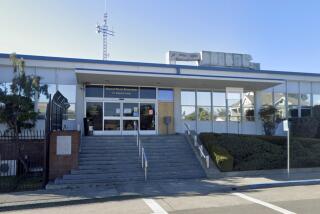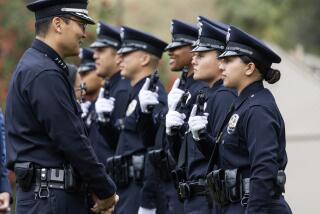Riverside Police Review Includes 4 Proposals
The Riverside Community Police Review Commission fielded scores of complaints, investigated three fatal shootings involving officers and recommended several policy changes to the Police Department in 2003, according to a year-end review that will be made public tonight.
Commission Chairman Mike Gardner, who will present that annual review to the City Council, said the panel still has work to do.
This year’s goals include improving relations with the city’s Police Department and police officers union and making the commission’s work better known to residents.
“The primary focus this year is better outreach into the community, attending community group’s functions -- the chamber, churches, service clubs,” Gardner said. The goal, he said, is to help residents understand “what the commission is and what it does and listen to what they have to say.”
The City Council established the commission in 2000 at the urging of a mayoral panel after four officers shot and killed Tyisha Miller in December 1998.
Miller, 19, had passed out in her car with a loaded gun on her lap. Police, seeking to get her medical aid, shattered a window. Three officers said later that she reached for the gun. Officers fired 24 times, sparking a furor in the city’s African American community.
The nine-member commission investigates complaints against police officers and has a budget this year of nearly $300,000.
The police union has opposed the commission since its inception, and four council members have expressed concern about its role and its budget.
Last year, Gardner said, the commission reviewed 95 complaints and agreed with 10% of the 188 allegations against officers. Details about allegations are not released because they involve personnel, but Gardner said most involved officer misconduct.
The commission also made four recommendations to the city’s Police Department; half are being acted on, and the remainder are still under consideration.
The department is creating a policy about shooting at moving vehicles and improving training in general about when officers should fire their weapons, taking into consideration proximity to bystanders and lighting.
The department is still reviewing a recommendation to record every encounter with a civilian; currently, every officer-initiated contact is tape-recorded. The police also are considering a suggestion to make investigations by its internal affairs division, which Gardner said were perfunctory, more aggressive.
In 2004, the commission wants to improve its workings with the police officers union and the department, he said.
The Riverside Police Officers Assn. has argued that the commission was unnecessary and redundant.
“I don’t think we’re going to change that position,” Gardner said. But “the commission is still here. We ought to be able to work together more cooperatively.”
Another obstacle Gardner hopes to resolve is one of public openness. Because so much of the commission’s work involves personnel matters, it is done in private.
Working with the Police Department and the city attorney’s office, Gardner said, the commission hopes to fashion a way to release information to the public while protecting officers’ rights.
Chani Beeman, chairwoman of the city’s Human Relations Commission, expressed support for the commission’s work but said she hoped that efforts to improve relations with the union and Police Department wouldn’t jeopardize the body’s independence. And she lauded any effort to improve public involvement.
“Transparency fosters trust and credibility,” she said.
More to Read
Sign up for Essential California
The most important California stories and recommendations in your inbox every morning.
You may occasionally receive promotional content from the Los Angeles Times.











